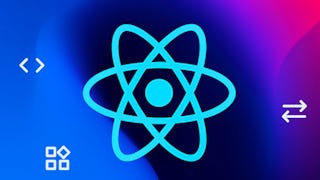- Browse
- Electron Js
Electron JS Courses
Electron JS courses can help you learn how to build cross-platform desktop applications using JavaScript, HTML, and CSS, while also covering concepts like integrating native APIs and managing application state. You can build skills in packaging applications for distribution, implementing auto-updates, and creating responsive user interfaces. Many courses introduce tools like Node.js for backend functionality and various libraries for enhancing user experience, ensuring you gain practical experience in developing robust applications.
Popular Electron JS Courses and Certifications
 Status: Free TrialFree Trial
Status: Free TrialFree TrialSkills you'll gain: Cloud Deployment, Software Development Life Cycle, Istio, Software Architecture, Node.JS, React Redux, Application Deployment, Restful API, Kubernetes, Database Design, CI/CD, Cloud-Native Computing, Responsive Web Design, NoSQL, OpenShift, Git (Version Control System), Ajax, Javascript, Azure DevOps, Engineering Software
4.6·Rating, 4.6 out of 5 stars9.2K reviewsBeginner · Professional Certificate · 3 - 6 Months
 Status: Free TrialFree Trial
Status: Free TrialFree TrialSkills you'll gain: Node.JS, API Gateway, MySQL, Restful API, MongoDB, Microservices, NoSQL, Object-Relational Mapping, Application Programming Interface (API), Database Design, Relational Databases, Unit Testing, SQL, Databases, Data Persistence, Server Side, Application Deployment, Javascript, Software Documentation, Data Modeling
3.7·Rating, 3.7 out of 5 stars114 reviewsIntermediate · Specialization · 3 - 6 Months
 Status: Free TrialFree Trial
Status: Free TrialFree TrialSkills you'll gain: React Redux, Front-End Web Development, React.js, JavaScript Frameworks, UI Components, Web Development, Javascript, Restful API, Event-Driven Programming, Application Programming Interface (API), Dataflow, GitHub
4.4·Rating, 4.4 out of 5 stars763 reviewsIntermediate · Course · 1 - 4 Weeks
 Status: Free TrialFree Trial
Status: Free TrialFree TrialSkills you'll gain: Node.JS, React Redux, Restful API, Database Design, Ajax, Database Application, Databases, Full-Stack Web Development, Server Side, NoSQL, Back-End Web Development, Front-End Web Development, Javascript, React.js, Performance Tuning, API Design, Data Structures, MongoDB, Debugging, JavaScript Frameworks
4.4·Rating, 4.4 out of 5 stars1.4K reviewsBeginner · Specialization · 3 - 6 Months
 Status: Free TrialFree Trial
Status: Free TrialFree TrialSkills you'll gain: Node.JS, Full-Stack Web Development, Server Side, Back-End Web Development, Restful API, Web Applications, Web Development, Cloud Computing, Web Servers, Javascript, GitLab, Authentications, JSON, Computer Science, Middleware
4.5·Rating, 4.5 out of 5 stars605 reviewsIntermediate · Course · 1 - 4 Weeks
 Status: Free TrialFree Trial
Status: Free TrialFree TrialSkills you'll gain: Jest (JavaScript Testing Framework), Web Development Tools, Javascript, Unit Testing, Programming Principles, Object Oriented Programming (OOP), Scripting Languages, Event-Driven Programming, Node.JS, Scripting, JSON, Computer Programming, Test Case, Data Structures, Debugging, Package and Software Management, Program Development, Front-End Web Development, Functional Design
4.7·Rating, 4.7 out of 5 stars4.9K reviewsBeginner · Course · 1 - 3 Months
What brings you to Coursera today?
 Status: NewNewStatus: Free TrialFree Trial
Status: NewNewStatus: Free TrialFree TrialSkills you'll gain: Scalability, Software Design Patterns, Node.JS, Distributed Computing, Dataflow, Event-Driven Programming, Object Oriented Design, Software Design, Load Balancing, Software Architecture, Performance Tuning, Real Time Data, Systems Architecture, File I/O, Redis, Object Oriented Programming (OOP), Systems Design, Application Performance Management, Javascript, Maintainability
Intermediate · Specialization · 3 - 6 Months
 Status: Free TrialFree Trial
Status: Free TrialFree TrialSkills you'll gain: User Research, Cascading Style Sheets (CSS), User Experience Design, User Experience, Design Research, Linux Commands, Usability, Debugging, User Interface (UI), Software Versioning, Software Visualization, Web Content Accessibility Guidelines, Pseudocode, JavaScript Frameworks, User Interface and User Experience (UI/UX) Design, Javascript, Web Applications, Event-Driven Programming, Unit Testing, Application Programming Interface (API)
Build toward a degree
4.7·Rating, 4.7 out of 5 stars24K reviewsBeginner · Professional Certificate · 3 - 6 Months
 Status: Free TrialFree TrialM
Status: Free TrialFree TrialMMeta
Skills you'll gain: Jest (JavaScript Testing Framework), React.js, Web Development Tools, Web Applications, Event-Driven Programming, JavaScript Frameworks, Application Programming Interface (API), Application Development, UI Components, Unit Testing, Front-End Web Development, Software Design Patterns, Context Management, Cascading Style Sheets (CSS), Javascript, Hypertext Markup Language (HTML), Data Management
4.7·Rating, 4.7 out of 5 stars3.6K reviewsIntermediate · Specialization · 1 - 3 Months
 Status: NewNewStatus: Free TrialFree Trial
Status: NewNewStatus: Free TrialFree TrialSkills you'll gain: React.js, React Redux, Cloud Deployment, Application Deployment, Cloud Applications, Software Testing, Web Development, Application Development, Jest (JavaScript Testing Framework), Frontend Integration, JavaScript Frameworks, Software Architecture, Javascript and jQuery, Front-End Web Development, Real Time Data, Application Programming Interface (API), Responsive Web Design, Event-Driven Programming, Cascading Style Sheets (CSS), UI Components
Beginner · Specialization · 3 - 6 Months
 Status: Free TrialFree TrialM
Status: Free TrialFree TrialMMeta
Skills you'll gain: Mobile Development, React.js, Web Applications, Event-Driven Programming, Application Development, UI Components, Front-End Web Development, Cascading Style Sheets (CSS), Javascript, Hypertext Markup Language (HTML), Data Management
4.7·Rating, 4.7 out of 5 stars2.6K reviewsBeginner · Course · 1 - 4 Weeks
 Status: NewNewStatus: Free TrialFree Trial
Status: NewNewStatus: Free TrialFree TrialSkills you'll gain: Scalability, Node.JS, Distributed Computing, Load Balancing, Performance Tuning, Systems Architecture, Redis, Application Performance Management, Microservices, OS Process Management
Intermediate · Course · 1 - 4 Weeks
What brings you to Coursera today?
In summary, here are 10 of our most popular electron js courses
- IBM Full-Stack JavaScript Developer: IBM
- RESTful Microservices Using Node.js and Express: NIIT
- Developing Front-End Apps with React: IBM
- JavaScript Programming with React, Node & MongoDB: IBM
- Developing Back-End Apps with Node.js and Express: IBM
- Programming with JavaScript: Meta
- Node.js Mastery: Streams, Patterns & High-Performance Apps: Packt
- Meta Front-End Developer: Meta
- Meta React: Meta
- React JS Masterclass - Go From Zero To Job Ready: Packt
Frequently Asked Questions about Electron Js
Electron JS is an open-source framework that allows developers to build cross-platform desktop applications using web technologies like HTML, CSS, and JavaScript. It combines the Chromium rendering engine and the Node.js runtime, enabling developers to create applications that can run on Windows, macOS, and Linux with a single codebase. The importance of Electron JS lies in its ability to streamline the development process, allowing for rapid prototyping and deployment of applications. This framework has gained popularity due to its versatility and the growing demand for desktop applications that offer a seamless user experience.
With skills in Electron JS, you can pursue various job roles in the tech industry. Common positions include Desktop Application Developer, Software Engineer, and Full-Stack Developer. Companies often seek professionals who can create efficient, user-friendly applications that run on multiple platforms. Additionally, roles such as UI/UX Designer and Front-End Developer may also benefit from knowledge of Electron JS, as it enhances the ability to create visually appealing and functional applications.
To effectively learn Electron JS, you should have a solid understanding of JavaScript, HTML, and CSS, as these are the core technologies used in the framework. Familiarity with Node.js is also essential, as it allows you to access system resources and perform backend operations. Knowledge of Git for version control and experience with front-end frameworks like React or Angular can further enhance your skill set. Additionally, understanding the basics of application architecture and design principles will help you create more robust applications.
Some of the best online courses for learning Electron JS include specialized programs that cover both the fundamentals and advanced topics. While specific Electron JS courses may not be widely available, you can find relevant content in broader web development courses. For instance, the Full-Stack Web Development: PHP, HTML, CSS & JavaScript Specialization offers a comprehensive foundation that can be beneficial when transitioning to Electron JS development.
Yes. You can start learning electron js on Coursera for free in two ways:
- Preview the first module of many electron js courses at no cost. This includes video lessons, readings, graded assignments, and Coursera Coach (where available).
- Start a 7-day free trial for Specializations or Coursera Plus. This gives you full access to all course content across eligible programs within the timeframe of your trial.
If you want to keep learning, earn a certificate in electron js, or unlock full course access after the preview or trial, you can upgrade or apply for financial aid.
To learn Electron JS, start by familiarizing yourself with the basics of JavaScript, HTML, and CSS. Once you have a good grasp of these technologies, explore online courses that focus on Electron JS or related web development topics. Practice building small applications to apply what you've learned and gradually increase the complexity of your projects. Joining online communities or forums can also provide support and resources as you navigate your learning journey.
Typical topics covered in Electron JS courses include setting up the development environment, creating user interfaces, managing application windows, and integrating Node.js features. Courses may also explore advanced topics such as packaging applications for distribution, handling file systems, and implementing security best practices. Learning about the Electron API and how to interact with native operating system features is also crucial for building robust applications.
For training and upskilling employees in Electron JS, consider courses that provide a comprehensive overview of web development principles alongside Electron-specific content. Programs like the MERN Stack Front To Back: Full Stack React, Redux & Node.js Specialization can be beneficial, as they cover essential skills that complement Electron JS development. This approach ensures that employees are well-equipped to create modern, cross-platform applications.










